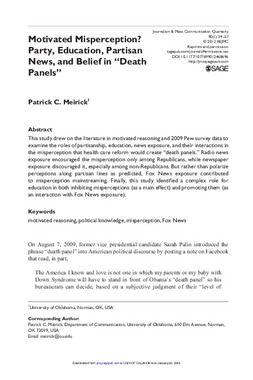| dc.contributor.author | Patrick C. Meirick | |
| dc.date.accessioned | 2016-01-14T19:53:33Z | |
| dc.date.accessioned | 2016-03-30T15:31:31Z | |
| dc.date.available | 2016-01-14T19:53:33Z | |
| dc.date.available | 2016-03-30T15:31:31Z | |
| dc.date.issued | 2013-03-01 | |
| dc.identifier.citation | Meirick, P. C. (2013). Motivated Misperception? Party, Education, Partisan News, and Belief in “Death Panels”. Journalism & Mass Communication Quarterly, 90(1), 39-57. doi: 10.1177/1077699012468696 | en_US |
| dc.identifier.uri | https://hdl.handle.net/11244/25317 | |
| dc.description.abstract | This study drew on the literature in motivated reasoning and 2009 Pew survey data to examine the roles of partisanship, education, news exposure, and their interactions in the misperception that health care reform would create “death panels.” Radio news exposure encouraged the misperception only among Republicans, while newspaper exposure discouraged it, especially among non-Republicans. But rather than polarize perceptions along partisan lines as predicted, Fox News exposure contributed to misperception mainstreaming. Finally, this study identified a complex role for education in both inhibiting misperceptions (as a main effect) and promoting them (as an interaction with Fox News exposure). | en_US |
| dc.language.iso | en_US | en_US |
| dc.publisher | Journalism & Mass Communication Quarterly | |
| dc.subject | motivated reasoning | en_US |
| dc.subject | political knowledge | en_US |
| dc.subject | misperception | en_US |
| dc.subject | Fox News | en_US |
| dc.title | Motivated Misperception? Party, Education, Partisan News, and Belief in “Death Panels” | en_US |
| dc.type | Research Article | en_US |
| dc.description.peerreview | Yes | en_US |
| dc.description.peerreviewnotes | https://us.sagepub.com/en-us/nam/manuscript-submission-guidelines | en_US |
| dc.identifier.doi | 10.1177/1077699012468696 | en_US |
| dc.rights.requestable | false | en_US |
